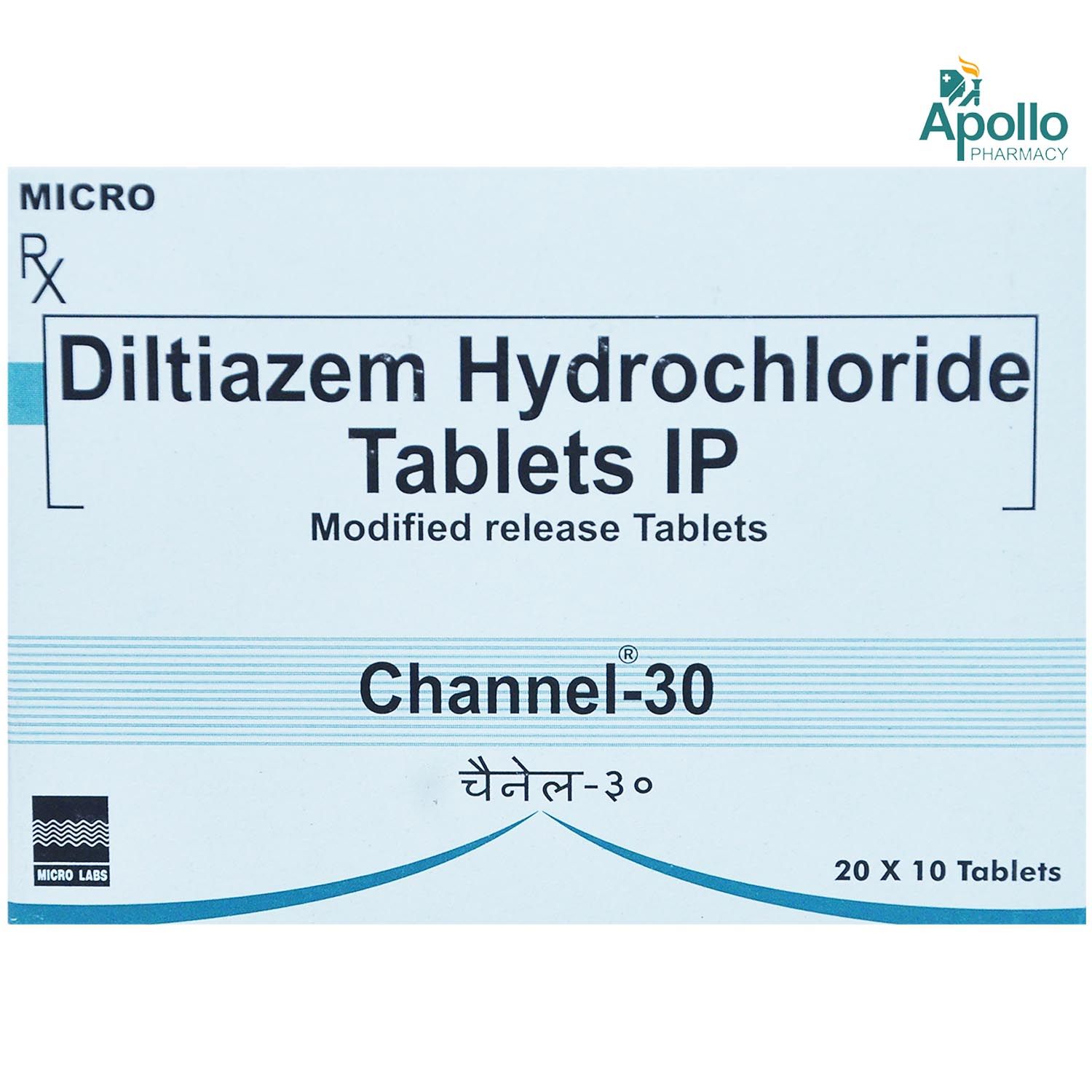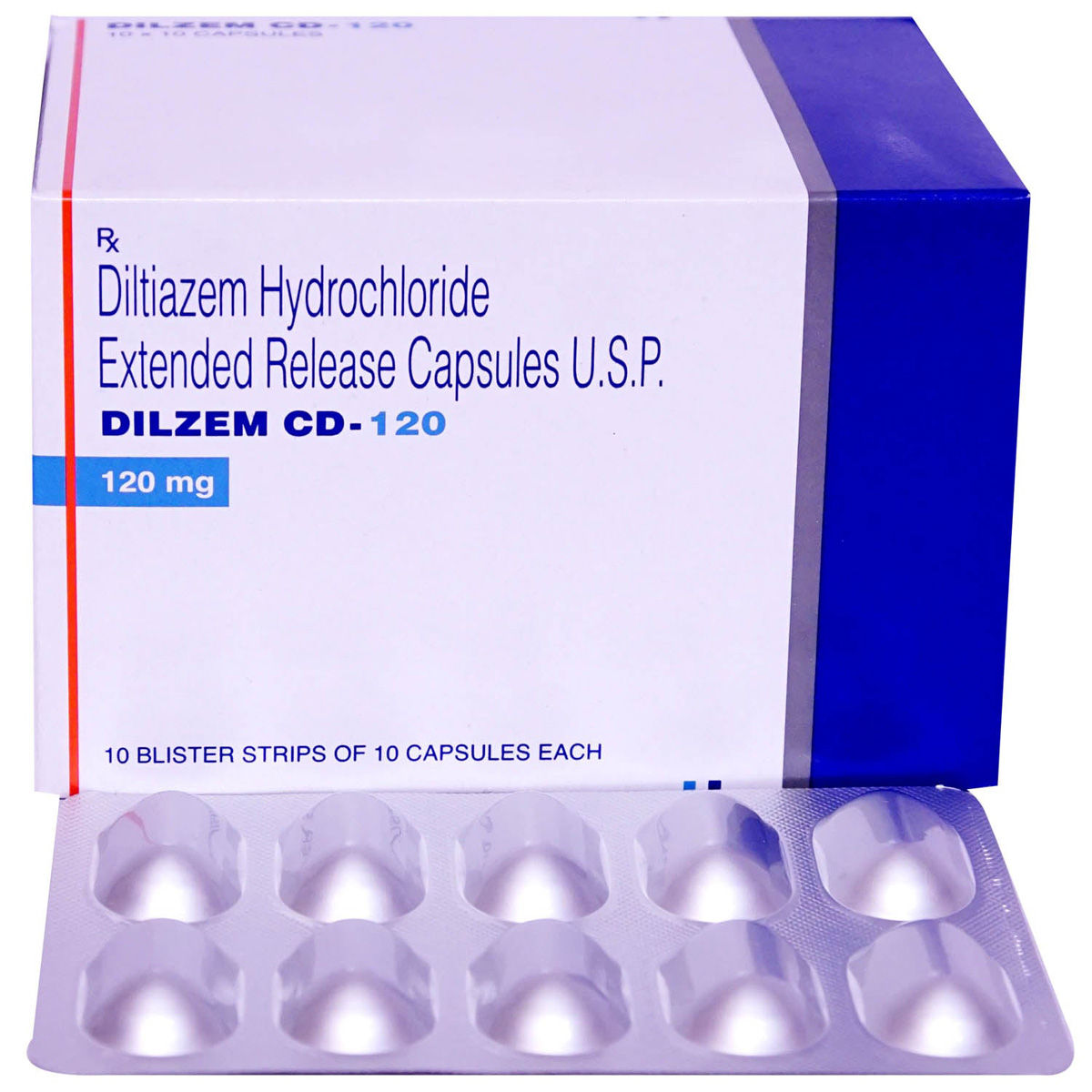Diltiazem Hydrochloride
About Diltiazem Hydrochloride
Diltiazem Hydrochloride belongs to the group of medicines called calcium channel antagonists indicated in atrial fibrillation, atrial flutter, and paroxysmal supraventricular tachycardia (PSVT). Atrial fibrillation or atrial flutter is a type of arrhythmia occurring due to disorganized electrical signals. PSVT is the episodes of rapid heart rate.
Diltiazem Hydrochloride contains 'Diltiazem hydrochloride', which works by inhibiting the influx of calcium ions, thereby slowing down the heart rate and reducing the strength of the cardiac cell contraction in patients with atrial fibrillation or supraventricular tachycardia.
Diltiazem Hydrochloride will be administered by a healthcare professional; do not self-administer. In some cases, Diltiazem Hydrochloride may cause side effects such as injection site reactions, hypotension (low blood pressure), and flushing. You are advised to talk to your doctor if you experience these side effects persistently.
Do not take Diltiazem Hydrochloride if you are allergic to any of its contents. Consult your doctor if you are pregnant or planning for pregnancy. Diltiazem Hydrochloride is not recommended for breastfeeding mothers and children. Keep your doctor informed about your health condition and medications to rule out any interactions/side effects.
Uses of Diltiazem Hydrochloride
Medicinal Benefits
Diltiazem Hydrochloride belongs to the group of medicines called calcium channel antagonists indicated for atrial fibrillation, atrial flutter and paroxysmal supraventricular tachycardia. Diltiazem Hydrochloride contains Diltiazem hydrochloride, which works by inhibiting the influx of calcium ions, thereby slowing down the heart rate and reducing the strength of the cardiac cell contraction in patients with atrial fibrillation or supraventricular tachycardia.
Directions for Use
Storage
Side Effects of Diltiazem Hydrochloride
- Injection site reactions (itching, burning sensation),
- Hypotension (low blood pressure)
- Vasodilation (flushing)
Drug Warnings
Do not take Diltiazem Hydrochloride if you are allergic to any of its contents. Inform your doctor if you have sick sinus syndrome (heart rhythm disorder)/second or third-degree AV block except in the presence of a functioning ventricular pacemaker, severe hypotension/low blood pressure, cardiogenic shock (the heart is unable to pump blood sufficiently), atrial flutter or atrial fibrillation associated with an accessory bypass tract such as in short PR syndrome or Wolff-Parkinson-White (WPW) syndrome (a condition in which an extra electrical pathway in the heart causes a rapid heartbeat), ventricular tachycardia (irregular heartbeat in ventricles), cardiac conduction, and congestive heart failure.
Drug Interactions
Drug-Drug Interactions: Diltiazem Hydrochloride may have interaction with anaesthetics, benzodiazepine (midazolam, triazolam), beta-blockers (propranolol), anti-anxiety (buspirone), antiarrhythmics (amiodarone), immunosuppressant (cyclosporine), and cardiac glycosides (digitalis).
Drug-Food Interactions: No interactions found/established.
Drug-Disease Interaction: Diltiazem Hydrochloride is contraindicated in cases such as sick sinus syndrome/second or third-degree AV block except in the presence of a functioning ventricular pacemaker, severe hypotension (low blood pressure), cardiogenic shock, atrial fibrillation or atrial flutter associated with an accessory bypass tract such as in WPW syndrome or short PR syndrome, and ventricular tachycardia.
Drug-Drug Interactions Checker List:
Safety Advice

Alcohol
cautionIt is not known if alcohol affects Diltiazem Hydrochloride. Please consult your doctor if you have any concerns regarding this.

Pregnancy
cautionDiltiazem Hydrochloride belongs to pregnancy category C medicine. Consult your doctor if you are pregnant or planning for pregnancy. Your doctor will prescribe only if the benefits outweigh the risks.

Breast Feeding
unsafeDiltiazem Hydrochloride may pass into breast milk; therefore, it is not recommended for use in breastfeeding mothers. Please consult your doctor if you have any concerns regarding this.

Driving
cautionDiltiazem Hydrochloride may cause dizziness. Avoid driving or operating machinery if you feel dizzy.

Liver
cautionDiltiazem Hydrochloride should be used with caution in case of liver impairment/liver disease. Please consult your doctor if you have any concerns regarding this.

Kidney
cautionDiltiazem Hydrochloride should be used with caution in case of kidney impairment/kidney disease. Please consult your doctor if you have any concerns regarding this.

Children
unsafeDiltiazem Hydrochloride is not recommended for children as efficacy and safety have not been established.
Habit Forming
Diet & Lifestyle Advise
- Include a diet rich in whole grains, lean proteins, vegetables, and fruits.
- Avoid smoking and alcohol consumption.
- Maintain proper weight with a healthy diet and safe exercises.
- Manage stress with meditation and yoga.
Special Advise
- Continuous monitoring of ECG and blood pressure is recommended whilst on treatment with Diltiazem Hydrochloride.
Patients Concern
Disease/Condition Glossary
Atrial fibrillation: Atrial fibrillation is a type of arrhythmia that occurs due to disorganized electrical signals in the heart. It is marked by a rapid and irregular pulse rate that causes poor blood flow. This condition may not have symptoms; if they occur, the symptoms include dizziness, fainting, palpitations (a feeling as if the heart is pounding or racing), weakness, shortness of breath, chest pain or tightness.
Atrial flutter: Atrial flutter is a condition in which the atria (heart's upper chambers) beat too fast. This causes the heart to beat rapidly. However, the pulse rate/rhythm is usually regular in case of atrial flutter. Symptoms include dizziness, palpitations, and shortness of breath.
Paroxysmal Supraventricular Tachycardia (PSVT): Supraventricular tachycardia is the episodes of the rapid heart rate which begin above the ventricles (the heart's lower chambers) occurring due to disruption of the heart's electrical signals. There may be symptoms such as palpitations or no symptoms at all.
FAQs
Diltiazem Hydrochloride belongs to the group of medicines called calcium channel antagonists indicated in atrial fibrillation, atrial flutter, and paroxysmal supraventricular tachycardia (PSVT). Atrial fibrillation or atrial flutter is a type of arrhythmia occurring due to disorganized electrical signals.
Diltiazem Hydrochloride works by inhibiting the influx of calcium ions, thereby slowing down the heart rate and reducing the strength of the cardiac cell contraction in patients with atrial fibrillation or supraventricular tachycardia.
Diltiazem Hydrochloride may cause hypotension (low blood pressure). Therefore, regular monitoring of blood pressure whilst on treatment with Diltiazem Hydrochloride is advised.
Diltiazem Hydrochloride may cause injection site reactions such as itching and/or burning sensation. Consult your doctor if the condition persists or worsens.
Diltiazem Hydrochloride and intravenous beta-blockers (used to treat high blood pressure and abnormal heart rhythms) should not be administered together or within a few hours. Consult your doctor before taking oral beta-blockers with Diltiazem Hydrochloride.
No, Diltiazem Hydrochloride is not a blood thinner. It is a calcium channel blocker used to treat high blood pressure (hypertension) and angina (chest pain caused by reduced oxygen supply to the heart muscle).
Diltiazem Hydrochloride may cause weight gain as a common side effect. However, if you experience unusual weight changes, manage it with a healthy diet, proper sleep, cutting down on carbs, reducing intake of oily or junk foods and staying hydrated. Consult the doctor to rule out any underlying conditions or medication-related effects.
Diltiazem Hydrochloride may cause sleeplessness as an uncommon side effect, though it does not affect everyone. If this symptom persists or becomes concerning, consult the doctor for further guidance.
Avoid receiving Diltiazem Hydrochloride, if you have extremely low blood pressure, a serious heart condition like 'sick sinus syndrome' or 'AV block' (unless you have a pacemaker), or if you recently had a heart attack accompanied by fluid build-up in your lungs. Consult the doctor if you have any concerns.
The symptoms of an overdose of Diltiazem Hydrochloride may include slow heart rate, low blood pressure, severe dizziness, or fainting. As it is an injection, it is unlikely to cause overdose, it is administered by the doctor or nurse.
Avoid consuming alcohol while taking Diltiazem Hydrochloride. Additionally, refrain from driving or operating heavy machinery if you feel dizzy or unwell after receiving this medication. Always follow the doctor’s advice regarding any additional precautions.
The serious side effects of Diltiazem Hydrochloride may include chest pain or an irregular heart rate, including fast, slow, or uneven beats, feeling light-headed or as if you might faint, symptoms of heart problems, such as swelling, rapid weight gain, or shortness of breath, signs of liver issues, including loss of appetite, upper right stomach pain, fatigue, itching, dark urine, pale stools, or jaundice (yellowing of the skin or eyes). Consult the doctor immediately if you notice any of these symptoms.
The duration of treatment with Diltiazem Hydrochloride will be determined by the doctor based on your medical condition being treated. Do not stop your scheduled dose of receiving Diltiazem Hydrochloride, as maintaining a consistent schedule is crucial for the effectiveness of the treatment. Therefore, always follow the instructions advised by the doctor to treat the condition effectively.
The common side effects of Diltiazem Hydrochloride include flushing, injection site reactions, and hypotension (low blood pressure). Consult the doctor if any of these side effects persist or worsen.








